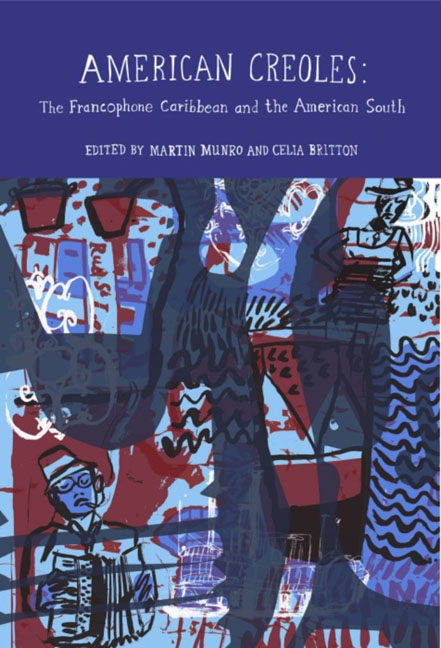Book contents
- Frontmatter
- Contents
- List of Illustrations
- Acknowledgements
- Introduction
- Creolizations
- Lafcadio Hearn's American Writings and the Creole Continuum
- Auguste Lussan's La Famille créole: How Saint-Domingue émigrés Became Louisiana Creoles
- Caribbean and Creole in New Orleans
- Creolizing Barack Obama
- Richard Price or the Canadian from Petite-Anse: The Potential and the Limitations of a Hybrid Anthropology
- Music
- Intertextualities: Faulkner, Glissant, Condé
- Notes on Contributors
- Index
Creolizing Barack Obama
from Creolizations
- Frontmatter
- Contents
- List of Illustrations
- Acknowledgements
- Introduction
- Creolizations
- Lafcadio Hearn's American Writings and the Creole Continuum
- Auguste Lussan's La Famille créole: How Saint-Domingue émigrés Became Louisiana Creoles
- Caribbean and Creole in New Orleans
- Creolizing Barack Obama
- Richard Price or the Canadian from Petite-Anse: The Potential and the Limitations of a Hybrid Anthropology
- Music
- Intertextualities: Faulkner, Glissant, Condé
- Notes on Contributors
- Index
Summary
La créolisation diffracte quand le métissage appauvrit.
Édouard Glissant, ‘Métissage et créolisation’, p. 50[Creolization diffracts while métissage flattens]
While the French, during Barack Obama's presidential campaign, overwhelmingly responded in a survey that they would be willing to elect a black president, the French language paradoxically does not have a proper epithet to name the American president. On 4 June 2008, Figaro journalist Pierre Rousselin described the then winner of the Democratic nomination as ‘a 46-year-old métis ’. Métis, a word embedded in the French history of slavery and colonialism, and today synonymous with either denigration or praise of racial and cultural mixing, has acted as Obama's default epithet in the French mainstream media. Through a reflection on the naming of the American president in French newspapers and in political or theoretical writings – from Metropolitan France and from the French Overseas Department of Martinique – this chapter's main concern is to illuminate the discrepancies between racial perceptions and constructions in continental France and in Martinique. While the Metropolitan French media favour the epithet métis, Martinicans privilege the process of creolization to attempt to describe the figure of Obama. The representation of Obama, then, functions as a helpful medium to reflect on contemporary racial and cultural constructions that do not travel well.
Obama as a symbol represents a particularly compelling example of the untranslatability of race since, as the new head of state of a powerful Western Nation, and as an immediately recognizable figure in global consciousness, he cannot be dismissed as a negligible exception. The notions of métissage – which attempts to stabilize race – and creolization – which destabilizes racial constructs – will guide us through our analysis of the naming and misnaming of Obama in Metropolitan France and in Martinique. My choice of the case of the French-Caribbean island of Martinique is particularly important in understanding the impact of the election of Obama on the collective psyche of a people predominantly issued from the Black Diaspora, located in the Americas, yet still part and parcel of France and of the European Union. The sense of influence between Martinique and Obama goes in both directions.
- Type
- Chapter
- Information
- American CreolesThe Francophone Caribbean and the American South, pp. 77 - 94Publisher: Liverpool University PressPrint publication year: 2012



